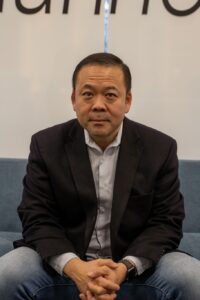Al the Builder
A career journey conversation with Albert “Al” Tiw
May 2023
I had not met Albert “Al” Tiw before we sat down for lunch at The Shore Club, an upscale restaurant a few blocks from Hannover Re’s Canadian headquarters in downtown Toronto. I nearly didn’t recognize him because today’s Al in no way resembles his LinkedIn photo. “I lost a lot of weight,” Al explained with a radiating smile and a hint of pride. It turns out that while some of us were packing on pounds during COVID-19, Al was getting lean.
Al credits his initial weight loss to eating better. As executive vice president and chief business development officer of a global reinsurer, he is on the road frequently. And as anyone who travels can attest, it’s challenging to make consistently good food choices while on the road. Once the business travel came to a halt in March 2020, Al lost 35 pounds within a few months just by making better food choices. To hone his leaner physique, he started to cross-train at a gym five times a week. His routine has turned into a lifestyle change, and he cannot imagine going back.
In this Q&A, Al shares insights into his career and life journey.
What drives you?
What drives me are three iterative processes: Learn. Perform. Teach.
- Learn: I’m a naturally curious person who finds enjoyment in focused learning with a specific goal. I’m not one who learns for the sake of learning, but rather it’s the application of this knowledge that gives me joy.
- Perform: I’m goal-oriented, and I am energized by taking on “building” projects. To be successful, one needs to utilize all acquired knowledge to solve problems. Hopefully, this will also allow for some creativity to find unique solutions. I don’t believe in just doing what everyone else is doing. I think that’s a recipe for failure. I believe you need to appreciate how things have been done so you can “leap-frog” and continually find ways to improve.
- Teach: Knowledge should not be hoarded. It needs to be shared with your teams. When I was deciding on career paths, I was contemplating between being a mathematician or a teacher. What I realized was I could be both. Teaching others is empowering them with knowledge, and it’s rewarding to see how they grow. In turn, they teach you, and the cycle continues.
You are a second-generation immigrant. How has that shaped your work?
I’ve seen the sacrifices my parents made to give me a life enriched with opportunities that I couldn’t have had if we had stayed in Malaysia. Seeing them struggle and adapt to a new culture and environment, seeing them have success with a lot of failures in between, and yet they were able to provide me with more than I needed. It fuels me as I want them to know it was a decision I not only appreciate but try and take advantage of to the fullest. I know many people have similar stories, and you don’t need to be an immigrant to have as much drive. I also see this as a “pay it forward” scenario with not only my children, but also all my colleagues and all people I engage with in my life.
In your long career as an actuary, has there been a role that felt like a setback but in hindsight was a blessing in disguise?
“Long career” makes me feel old! In the first decade of my career, I was lucky to be given multiple opportunities and received guidance from great people who I consider both mentors and friends. I grew up in various pricing and product roles that gave me freedom to exercise creativity and problem-solving skills. Then, one day, I was informed I was tasked to manage implementation of a reinsurance administration system for the next two years and needed to give up my then-pricing responsibilities.
I did not take that well. True, the organization was experiencing tremendous growth, and there was a real business need to have that reinsurance administration system in place. But I viewed it as a demotion and honestly thought it was an exile. I approached my manager and asked if I was being punished for a failing I wasn’t aware of. Instead, I was told it was a learning opportunity, and my career would benefit from this experience. I did not believe it and walked away, sulking.
Over the course of the project, I worked with some great people and gained an appreciation for the practical implementation issues of reinsurance treaties I had personally negotiated. Sometimes it takes walking in other people’s shoes to appreciate what they contribute to an organization. I gained new skills, perspectives and professional tools, which greatly furthered my education and understanding of the industry. It truly was a learning opportunity, and I consider that project one of my proudest achievements. I appreciate and remain thankful to everyone who contributed to that success.
What attracted you to join Hannover Re L&H Canada as one of its first employees?
Hannover Re Canada was an opportunity to build from a business case on paper to a thriving organization. By premium, Hannover Re is the third largest reinsurer in the world, yet it maintains a nimble structure that is aligned with my personal working preferences. I joined the organization as employee No. 3. In the first few years, we all wore multiple hats. We were pricing, marketing, corporate, administration and office managers all at once. We were fueled by the passion and camaraderie of our small team.
Now, in its eighth year, we have grown to a staff of 24. I am proud of what we have accomplished as an organization and firmly believe our future looks bright. But I am even prouder of the teams we have created, as great people are the true strength of an organization. Where we go from here—the sky’s the limit. I have been blessed to work with some of the industry’s elites and am in awe of their constitution, particularly when it comes to working with me! They all have my respect and honor.
I am still holding onto my laptop with issue number CAN000001, though. No one is taking that piece of hardware from me!
Since presumably you have departed from day-to-day actuarial work, how have the skills you gained earlier in your career helped in your current role? What do you look for when you assemble a team?
I still do actuarial work every day! I like keeping my hands dirty, so to speak. However, I will say the roles I have taken have generally leaned to my work preferences, style and interests. This has given me the best chances for success. This comes with a personal understanding of your own strengths and weaknesses and, honestly, I would encourage everyone to go through this process.
What I also appreciate is that all the skills you acquire over your career are like tools in your toolbox. Everyone is trying to further their organization. I’ll use the analogy that we are all building a house. If the only tool you have in your toolbox is a wrench, you are ideal for tightening a bolt. That’s your specialty. However, what happens if you need to hit a nail? You could use the flat side of your wrench if that’s the only tool you have; however, it may be better to gain the skill of a hammer or better yet, find a teammate who is an expert hammerer. The more tools you and your team have, the more you can accomplish.
Do you consider yourself a contrarian? Why or why not?
I don’t think of myself as a contrarian; however, I do believe in the saying, “If you only do what you’ve always done, you’ll only get what you’ve always gotten.”
Change is the only constant, and I think it’s incumbent on everyone to continually learn and improve. In fact, I would say the pace of change is getting faster, requiring not only adaptation but anticipation, which means at times you may be completely wrong. However, going through that thinking process is half the benefit, provided you learn from prior choices.
How do you define success and fulfillment?
To me, success and fulfillment are a journey about understanding oneself. Early in your career, you might define success as a VP title, a big salary or the number of direct reports. It is human nature to compare your accomplishments against your peers or classmates from college, but you don’t always know the underlying priorities and circumstances that have led others to their achievements.
Further, a true accounting of your own strengths and weaknesses is important to position yourself for success. No one type is dominant and ensures superiority. It is understanding what and with whom you need to surround yourself, so collectively you can succeed. For me, it’s a combination of seeing healthy growth in both my home family and my work family, and building a strong organization and team to entrust with the future.
What advice do you have for mid-career actuaries? What about new fellows?
Two things:
- Find a mentor. This should be someone you respect and can learn from in a trusted environment. That person doesn’t need to be in the same profession; in fact, sometimes it’s better if they’re not. It should be someone with whom you share principles and admire. The mentor will provide guidance, feedback and support when needed. Good mentors are very hard to find but are absolutely invaluable. A corollary to this is to be a mentor. Everything you have received, pass on to others whenever possible. Pay it forward. Trust me, your understanding of yourself will continue to grow, irrespective of your role.
- Define your brand. How would you like to be known? Sometimes merely articulating your brand will help you focus on what you deem important and guide your career. There is much written about the differences between your reputation versus your brand. This topic is an article in itself; however, I would encourage everyone to understand the differences and make themselves more visible.
What’s your morning routine?
After years of commuting to Toronto from Burlington, I have the GO Train schedule down pat. Get up at 5 a.m., get to the gym with my wife, Karen, for the 6 a.m. CrossFit workout, and take the 7:19 a.m. Express GO train in Burlington, during which time I practice my languages including German, French and Spanish in my Duolingo app (I am on an over 500-day streak!) and get to my office with the first cup of coffee at 8:10 a.m. This is the routine five days a week. Hannover Re allows hybrid work, and most of the team makes use of that, but I personally enjoy being in the office.
Statements of fact and opinions expressed herein are those of the individual authors and are not necessarily those of the Society of Actuaries or the respective authors’ employers.
Copyright © 2023 by the Society of Actuaries, Chicago, Illinois.

